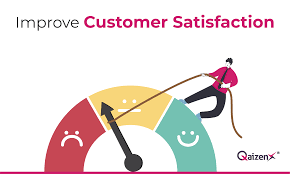Enhancing Business Success Through Customer Satisfaction

The Importance of Customer Satisfaction
Customer satisfaction is a crucial aspect of any successful business. It refers to the level of fulfilment that customers experience after interacting with a company’s products or services. Happy customers are not only more likely to make repeat purchases but also to recommend the business to others, leading to increased sales and growth.
Building Trust and Loyalty
When customers are satisfied with their experience, they are more likely to trust the brand and become loyal patrons. A loyal customer base is invaluable as it provides a steady revenue stream and helps create a positive reputation for the business.
Enhancing Brand Reputation
Customers who are satisfied with their interactions are more likely to speak positively about the brand, whether through word-of-mouth recommendations or online reviews. This positive feedback can help attract new customers and build a strong brand image in the market.
Driving Business Growth
By prioritising customer satisfaction, businesses can differentiate themselves from competitors and stand out in a crowded marketplace. Satisfied customers are more likely to choose your products or services over others, leading to increased sales and profitability.
Improving Customer Retention
Retaining existing customers is often more cost-effective than acquiring new ones. By focusing on customer satisfaction, businesses can reduce churn rates and increase customer lifetime value, ultimately boosting long-term success.
Conclusion
Customer satisfaction should be at the forefront of every business strategy. By prioritising customer needs and delivering exceptional service, businesses can build strong relationships, drive growth, and secure their position in the market.
Six Key Benefits of Prioritising Customer Satisfaction for Business Success
- Enhances brand reputation
- Builds customer loyalty
- Increases customer retention
- Drives positive word-of-mouth marketing
- Boosts sales and revenue
- Differentiates the business from competitors
Challenges and Drawbacks of Prioritising Customer Satisfaction
- Customer satisfaction can be subjective and challenging to measure accurately.
- Maintaining high levels of customer satisfaction may require significant resources and investment.
- A focus on immediate customer satisfaction may lead to neglecting long-term business goals.
- In some cases, overly catering to individual customer preferences for satisfaction can be unsustainable or unprofitable.
Enhances brand reputation
Enhancing brand reputation is a significant benefit of prioritising customer satisfaction. When customers have positive experiences with a brand and are satisfied with the products or services received, they are more likely to share their experiences with others. This word-of-mouth promotion can help build a strong and favourable reputation for the brand in the market. As more customers speak positively about the brand, it can attract new customers, increase brand awareness, and establish the business as a trusted and reliable choice among consumers. Ultimately, a solid brand reputation built on customer satisfaction can differentiate the business from competitors and contribute to long-term success.
Builds customer loyalty
Building customer loyalty is a significant advantage of prioritising customer satisfaction. When customers are consistently pleased with their interactions with a business, they are more likely to develop a sense of trust and attachment to the brand. This loyalty leads to repeat purchases, increased customer retention, and positive word-of-mouth recommendations, ultimately creating a loyal customer base that forms the foundation for long-term success and sustained growth.
Increases customer retention
One significant benefit of prioritising customer satisfaction is the increase in customer retention. When businesses focus on meeting and exceeding customer expectations, it fosters loyalty and trust among their clientele. Satisfied customers are more likely to continue patronising the company, leading to higher retention rates and long-term relationships. By nurturing these loyal customers through exceptional service and tailored experiences, businesses can secure a stable revenue stream and build a strong foundation for sustainable growth.
Drives positive word-of-mouth marketing
Satisfied customers are powerful advocates for a business, driving positive word-of-mouth marketing that can significantly impact brand reputation and attract new customers. When customers have a positive experience and are satisfied with the products or services they receive, they are more likely to share their enthusiasm with friends, family, and colleagues. This organic promotion can lead to increased visibility and credibility for the business, ultimately contributing to its growth and success in the market.
Boosts sales and revenue
A key benefit of customer satisfaction is its ability to boost sales and revenue for businesses. Satisfied customers are more likely to make repeat purchases and also tend to spend more per transaction. By providing excellent products and services that meet or exceed customer expectations, businesses can foster loyalty and encourage customers to return for future purchases, ultimately driving up sales figures and revenue streams. Customer satisfaction acts as a catalyst for increased profitability and sustainable growth in the long term.
Differentiates the business from competitors
Achieving high levels of customer satisfaction can effectively differentiate a business from its competitors in a crowded marketplace. When customers receive exceptional service and have positive experiences with a company, they are more likely to choose that business over others offering similar products or services. By consistently meeting and exceeding customer expectations, a business can carve out a unique position in the market based on its reputation for excellent customer satisfaction, ultimately setting itself apart from competitors and attracting a loyal customer base.
Customer satisfaction can be subjective and challenging to measure accurately.
Customer satisfaction can be a challenging metric to measure accurately as it is inherently subjective. Different customers may have varying expectations and perceptions of what constitutes a satisfactory experience, making it difficult to establish a universal standard for satisfaction. Factors such as personal preferences, cultural backgrounds, and individual circumstances can all influence how customers perceive their interactions with a business. This subjectivity can pose a conundrum for companies seeking to gauge and improve customer satisfaction levels effectively. Implementing diverse feedback mechanisms and continuously adapting strategies based on customer insights can help address this inherent challenge in measuring customer satisfaction accurately.
Maintaining high levels of customer satisfaction may require significant resources and investment.
Achieving and sustaining high levels of customer satisfaction can present a challenge for businesses, as it often demands substantial resources and investment. From implementing quality control measures to providing exceptional customer service, maintaining a consistent standard of satisfaction requires dedicated efforts across various aspects of the business. This can involve financial commitments for training staff, upgrading systems, and enhancing product offerings to meet customer expectations. Despite the costs involved, prioritising customer satisfaction remains crucial for long-term success and competitiveness in today’s market landscape.
A focus on immediate customer satisfaction may lead to neglecting long-term business goals.
In the pursuit of immediate customer satisfaction, businesses may inadvertently overlook their long-term strategic objectives. While prioritising short-term gratification can result in positive customer experiences, it may also divert attention and resources away from sustainable growth and profitability. Neglecting long-term business goals in favour of immediate customer satisfaction could hinder strategic planning, innovation, and overall business development, potentially limiting the company’s ability to adapt to changing market conditions and secure future success. Balancing short-term customer needs with long-term business goals is essential for achieving sustained growth and maintaining a competitive edge in the market.
In some cases, overly catering to individual customer preferences for satisfaction can be unsustainable or unprofitable.
In some instances, excessively tailoring to individual customer preferences in pursuit of satisfaction can pose challenges for businesses, making it unsustainable or unprofitable. Meeting highly specific demands for each customer may require significant resources, time, and effort that could outweigh the benefits gained from those particular transactions. Moreover, constantly customising products or services to individual preferences may not align with the overall business model or target market, potentially leading to inefficiencies and financial strain. Striking a balance between meeting customer needs and maintaining operational viability is essential to ensure long-term success and profitability.



